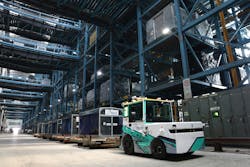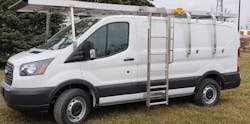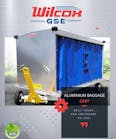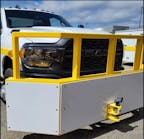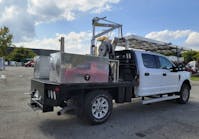Hong Kong Air Cargo Terminals Limited (Hactl) – Hong Kong’s largest independent cargo handler – is progressing its plan to introduce autonomous electric tractors (AETs) to its ramp operations in 2024.
Hactl has signed a memorandum of understanding (MoU) with Westwell Holdings (Hong Kong) Ltd. (Westwell) to collaborate on the introduction of the vehicles. Hactl aims to develop autonomous vehicles which – in addition to the relatively simple task of towing cargo dollies – automatically couple and uncouple the dollies, and adjust to their differing specifications.
Once testing and final on-site tuning and mapping to Hactl’s specific requirements are completed, the AETs will be progressively integrated into Hactl’s current driver-controlled tractor fleet, and will initially tow loaded import ULDs on a 1-km route between the outdoor ULD staging area, and the main terminal ULD system intake deck of SuperTerminal 1. AETs will be used on longer and more complex routes in due course.
Safety is the major consideration in operating the new vehicles. Each AET is equipped with a highly-accurate GNSS system and uses multiple HD cameras and LiDAR sensors to detect all objects and avoid collisions. The AETs have similar capabilities to the current diesel-powered tractor fleet, but operational speeds will be restricted to 8kph as an additional safety measure.
The AETs have a range of up to 75km per charge; being electrically-powered, they will also make a significant contribution to Hactl’s carbon reduction programme.
One of Hactl’s main motivations in moving to autonomous vehicles is the ongoing challenge of recruiting, explains Wilson Kwong, chief executive of Hactl.
“Recruitment for airport-related work, and particularly airside work, is becoming ever more challenging. This means we must utilise our available workforce as efficiently as possible, and deploy them on those duties which make best use of their experience, skills and abilities,” Kwong said.
“After extensive investigation and research, we believe that the work of operating towing tractors over set routes should now be feasible using the latest autonomous vehicle technology, and that this can be achieved without compromising safety. Although driverless vehicles are becoming established technology, Hactl is enhancing the concept with the addition of automated functions specific to its needs.”
“Handling facilities are crucial elements in the logistics chain. Westwell will leverage the latest artificial intelligence technology and clean energy, to assist Hactl in building a fully automated cargo terminal integrating green, intelligent, and efficient features,” adds Kenny Tan, chairman of Westwell.
The deployment of AETs is Hactl’s first step in the potential wider use of autonomous vehicles throughout its operations, adds Kwong. “This is just the beginning. We are exploring additional applications for this technology, with the aim of further improving productivity and freeing up staff for more demanding duties, while continuing to reduce our environmental impact.”
